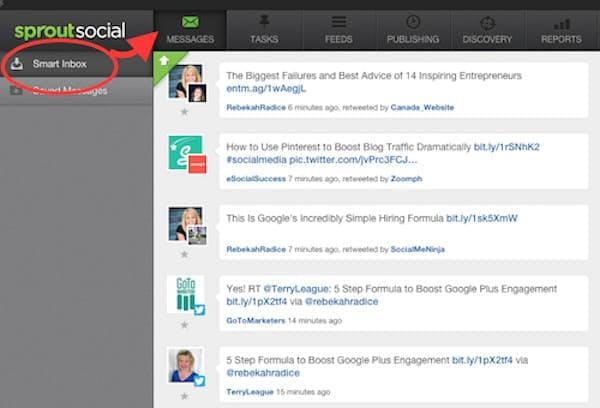Are you struggling to make social media work for your small business? Still not convinced it's the right place to be? Although most small businesses believe social media can be an effective marketing tool, very few understand how to master it.
This ineffective strategy ends up hurting rather than helping business growth. So, where are you falling down within your use of social media?
Below are six reasons social media isn’t working for your business and how to fix it.
1. You’re a number collector
As many companies would like to believe that social media is just a numbers game, the truth is the opposite. While chasing fan and follower count might seem logical, the larger the number, the bigger your reach -- it’s counter-intuitive to the true value within social media.
If you want to establish meaningful connections, you must get into the conversation and stop worrying about the numbers. Whether you’re looking to connect with peers, influencers, or consumers, the fastest way I know how to establish rapport is through relationship building.
And guess what? There’s no magic in it. You don’t need special tools or fancy skills. All you need is the willingness to get to know people. I challenge you to find five people each day that you can reach out to.
Here are a few ways to do that:
- Ask a question
- Share a story
- Talk about a shared interest
- See how you can lend a helping hand
- Be kind and encouraging
The key is to not only learn more about your audience but also gain valuable insight into what makes them tick. Your goal is to be a relationship builder, not just a number collector.
As Dale Carnegie said,
“You can make more friends in two months by becoming interested in other people than you can in two years by trying to get other people interested in you.”
2. No system to keep in touch
If I asked you how you were monitoring your social media mentions, would you have an answer? And if so, could you tell me how to quickly respond in real time? With 70 percent of U.S. households now using the Internet to shop for local products and services, can your business afford to be absent on social media? The obvious answer is no.
Not having a system in place to stay in touch across your social channels can (and most likely will) adversely affect the very relationships you are working to build. Sound complicated? It doesn't have to be.
Use a tool like Sprout Social and their Smart Inbox to monitor what’s being said in and around your business. A quick reply goes a long way when looking to establish camaraderie.

3. No value proposition
Your social media connections are looking to learn more about you. They want to know what you have to offer. They want to know your value proposition.
So, what is a value proposition? As explained by Wikipedia,
"A value proposition is a promise of value to be delivered and acknowledged and a belief from the customer that value will be appealed and experienced."
Now knowing that could you tell me what you do or how you help people? And if so, would your answer be short, clear, and concise? Not only should you be able to articulate your value easily, but also in a way that makes sense to your audience.
A Quick Way to Identify Your Compelling Value Proposition
Take a look at your business through the eyes of your consumer and answer a few questions.
- What are you offering your audience that changes their lives for the better?
- What does your product or service do to enhance or improve their current situation?
- What key problem(s) are you solving?
- Is your product or service unique and compelling?
I guarantee that if you can clearly communicate your value, you will inspire engagement and ultimately encourage sales.
4. Lack of a unique personality
When was the last time you looked at your social media accounts? If your answer was never, then it’s time for a review. Analyze your bio, tweets and posts. How would you view this content if you were a potential client? Are the mission, vision and values of your business clearly stated? Have you taken the opportunity to create your own unique persona or are you a cookie-cutter clone of your competition?
Whether you’re shy or concerned about taking a stand, don't be afraid to put yourself out there. People bond with people, not businesses. In order to create better connections, you need to humanize your business. You do this by injecting personality into the online life of your business. Take all of the offline goodness that makes your business special and translate it into a vibrant online persona.
As Guy Kawasaki says,
"The goal is to provide inspiring information that moves people to action."
To better understand what differentiates you from the competition and encourage your audience to take action, answer a few questions.
KEYS TO DIFFERENTIATION
- What are you passionate about and what could you talk about all day long?
- What’s your specialty?
- What is your top skill or unique ability?
- What do you excel at?
- What makes you stand out from the competition?
- What pain, need or concern can you solve for potential clients?
5. No commitment to consistency
Want to create better connections? Stop posting sporadically. Commit to showing up when and where your customers are spending their time online. That commitment builds trust. It also establishes a professional, reliable and credible online presence.
It's no secret that small businesses rely on repeat customers and referrals. In fact, according to Constant Contact,
82% of small business owners say their main source of new business is referrals.
Based on that, doesn’t it make sense to commit to a consistent social media strategy that raises business awareness and allows for improved customer perception? Put a plan in place that makes posting, commenting and connecting quick and easy.
Here's where to get started:
10 Steps to a Solid Social Media Strategy from Rebekah Radice
6. Following a one-size fits all strategy
Before you even begin to market your small business using social media, you need to do two things. First, figure out where your target audience is hanging out, and second, determine what content they’re looking for on each social network.
Since all social media platforms have distinct cultures of their own, your small business needs to optimize content and conversation for each. For example, if you’re a local bakery, your Facebook following might appreciate special offers they’ll only find on your page.
On the other hand, your Instagram and Pinterest followers might want pictures of your delicious treats along with recipes and a glimpse into your kitchen.
To determine how you’ll share content across each social network, look at the who, what, when, where, why and how. How can you do that?
Here’s how to break it down in your business:
- Who: Who’s problem are you solving on each social network and who will be connecting with your content?
- What: What’s your best content that will solve that unique challenge?
- When: When are your fans and followers spending their time on each of your social channels?
- Where: Where will all of the content you share come from? Is it pre-existing or will you need to create it?
- Why: Why does solving this problem(s) make a difference in the life of your potential client?
- How: How is your product or service a benefit and how will you translate that across each specific social network?
Final thoughts
If you want to build a reputable business through the power of social media and lend credence to your claim as an authority figure, you must commit to staying at the forefront of your consumer's minds.
Just know that establishing a solid social media presence won't happen overnight. It also won't provide instant results. It takes time, practice and consistency. While there’s no one-size fits all solution to social media, there are proven strategies that can help you embrace its benefits.
Potential clients are actively looking for what your business has to offer. If you’re not leveraging social media to put your product or service in the palm of their hand, your competition is. How can you activate the power of social media in your small business?
About Rebekah Radice
Rebekah Radice, co-founder of BRIL.LA, has traded narcissism for purpose. When not driving growth, you'll find her tricking family into thinking she's Emeril Lagasse - likely covered in marinara. The spotlight was fun, but impact is better. These days she's using 20+ years of brand brilliance for good.
